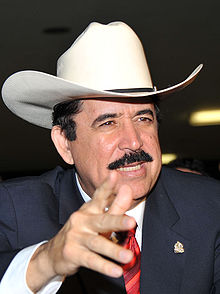Mel Zelaya
| Manuel Zelaya | |
|---|---|
 |
|
| President of Honduras | |
|
In office 27 January 2006 – 28 June 2009 |
|
| Vice President |
Elvin Ernesto Santos Arístides Mejía (as Vice-Presidential Commissioner) |
| Preceded by | Ricardo Maduro |
| Succeeded by | Roberto Micheletti (interim) |
| Deputy of the Olancho Department | |
|
Assumed office 25 January 2014 |
|
|
In office 25 January 1986 – 25 January 1998 |
|
| Personal details | |
| Born |
José Manuel Zelaya Rosales 20 September 1952 Catacamas, Olancho, Honduras |
| Political party |
Liberal Party (until 2011) LIBRE (2011–present) |
| Spouse(s) | Xiomara Castro |
| Alma mater | National Autonomous University of Honduras (Incomplete) |
| Manuel Zelaya was deposed on 28 June 2009 and the National Congress swore in Roberto Micheletti. | |
José Manuel Zelaya Rosales (born 20 September 1952) is a Honduran politician who was President of Honduras from 27 January 2006 until 28 June 2009. He is the eldest son of a wealthy businessman, and inherited his father's nickname "Mel". Before entering politics he was involved in his family's logging and timber businesses.
Elected as a liberal, Zelaya shifted to the political left during his presidency, forging an alliance with the ALBA. On 28 June 2009, during the 2009 Honduran constitutional crisis, he was seized by the military and sent to Costa Rica in a coup d'état. On 21 September 2009 he returned to Honduras clandestinely and resurfaced in the Brazilian embassy in Tegucigalpa. In 2010 he left Honduras for the Dominican Republic, an exile which lasted more than a year.
He now represents Honduras as a deputy of the Central American Parliament. Since January 1976 Zelaya has been married to Xiomara Castro de Zelaya who was a presidential candidate in the 2013 general election, but lost to Juan Orlando Hernández.
The surname 'Zelaya' is a word from the Basque language, meaning 'field'.
Zelaya was born the eldest of four children in Juticalpa, Olancho. Two of his brothers remain alive. Zelaya's mother, Ortensia Rosales de Zelaya, has been described as his best campaigner. His family first lived in Copán, then they moved east to Catacamas, Olancho.
He attended Niño Jesús de Praga y Luis Landa elementary school and the Instituto Salesiano San Miguel. He began his university studies in civil engineering, but left in 1976 with 11 courses completed, for agriculture and the forestry sector. He was forced to take over the family business because of the arrest of his father José Manuel Zelaya Ordoñez, implicated in the murders known as "Slaughter of the Horcones." These murders also involved Mayor José Enrique Chinchilla, Sub-Lieutenant Benjamín Plata, José Manuel Zelaya Ordoñez (property owner) and Carlos Bhar. They were charged and taken to the Central Prison; after four years in prison, they were favored with a pardon from the head of state, General Policarpo Paz García, in 1979. He has engaged in business activities that including timber and cattle, handed down to him by his late father. He is now a landowner in Olancho. In 1987, Zelaya became manager of the Honduran Council of Private Enterprise (COHEP), as well as of the National Association of Wood Processing Enterprises. The COHEP occupies a particularly important role in Honduran politics, as the Constitution delineates that the organization elects one of the seven members of the Nominating Board that proposes nominees to the Supreme Court of Honduras.
...
Wikipedia
